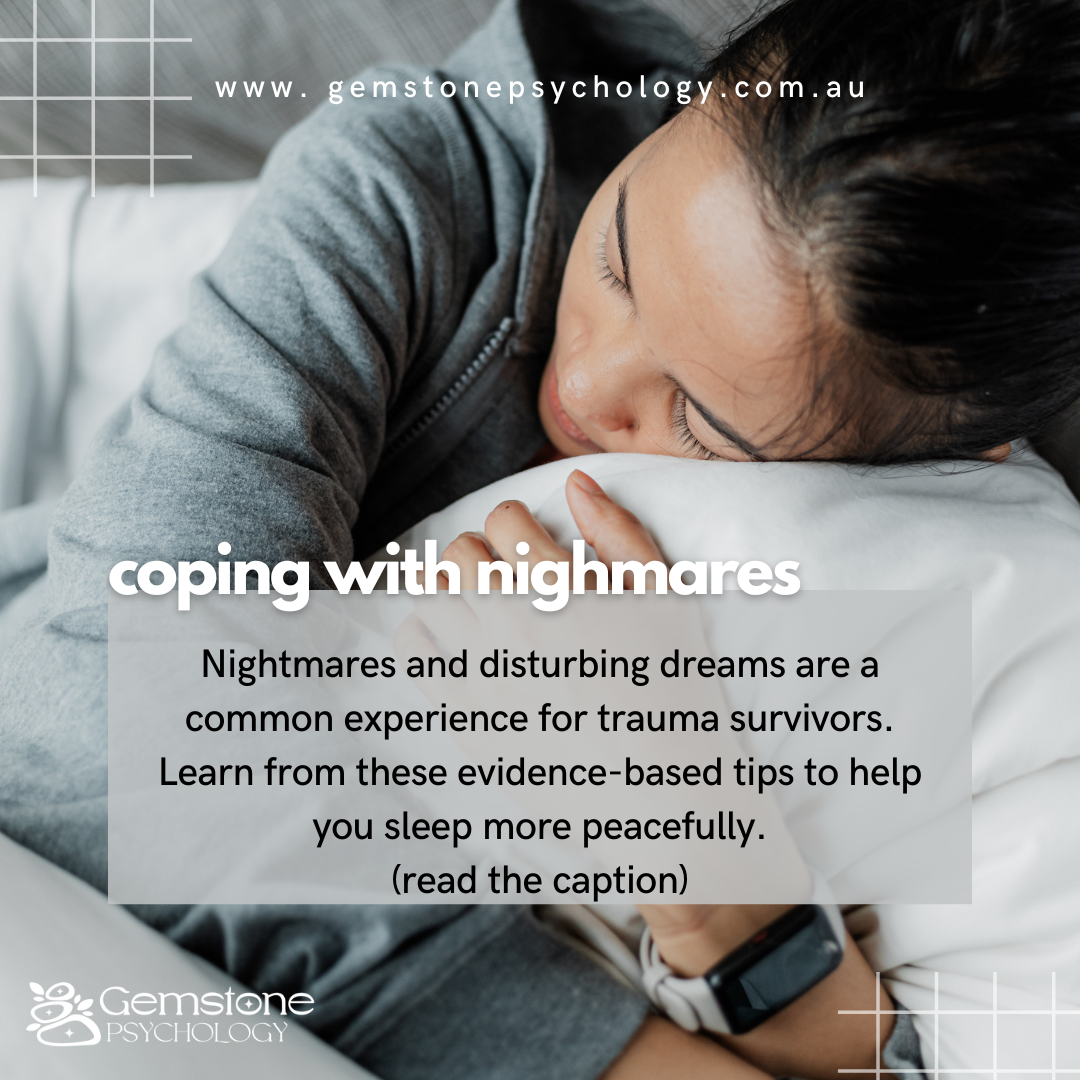Coping with Nightmares
Nightmares can be unsettling, leaving us feeling shaken and distressed even after waking up. For adults who have experienced trauma or adverse events, nightmares can be particularly challenging, as they may serve as unwelcome reminders of past experiences. I know what it's like to get recurring nightmares, and I have experienced how much they can impact both sleep and daily life. Trust me when I say that there are ways to find relief from the torment of nightmares.
Let’s explore what nightmares are, why they happen, and offer some evidence-based tips to help manage them.
What are Nightmares?
〰️
What are Nightmares? 〰️
Nightmares are vivid, disturbing dreams that evoke strong feelings of fear, anxiety, or sadness. They often involve scenarios that are threatening or traumatic, such as being chased, attacked, or experiencing a loss. Unlike regular dreams, nightmares can cause intense emotional distress and may even disrupt sleep patterns, leading to fatigue and daytime impairment. Nightmares can often mirror the theme or emotional tone of past stressful events.
Why do they happen?
〰️
Why do they happen? 〰️
Why do Nightmares Happen?
Nightmares can have various causes, including psychological, biological, and environmental factors. For adults who have experienced trauma or adverse events, nightmares may be a manifestation of unresolved emotions or memories associated with the trauma. The brain’s natural response to processing and integrating distressing experiences can sometimes result in the replaying of traumatic events during sleep.
Evidence-based tips
〰️
Evidence-based tips 〰️
Managing Nightmares: Evidence-Based Tips
While nightmares can be distressing, there are strategies that adults who have experienced trauma can use to help manage them. Here are a few evidence-based tips:
1. Create a Relaxing Bedtime Routine: Establishing a calming bedtime routine can help signal to your body and mind that it’s time to unwind and prepare for sleep. This may include activities such as reading, practicing relaxation exercises, or taking a warm bath.
2. Practice Stress Reduction Techniques: Engage in stress reduction techniques such as mindfulness meditation, deep breathing exercises, or progressive muscle relaxation throughout the day and especially before bedtime. These techniques can help reduce overall levels of anxiety and promote relaxation.
3. Create a Safe Sleep Environment: Make your sleep environment as comfortable and conducive to relaxation as possible. This may involve adjusting the lighting, temperature, and noise level in your bedroom, as well as removing any potential distractions that could disrupt sleep.
4. Limit Exposure to Triggers: Identify and limit exposure to potential triggers that may contribute to nightmares, such as violent movies or news stories, stressful situations, or caffeine and alcohol consumption close to bedtime.
5. Seek Professional Help: If nightmares persist and significantly impact your quality of life, consider seeking support from a mental health professional with experience in trauma-informed care. Therapy modalities including eye movement desensitization and reprocessing (EMDR), and imagery rescripting can be effective in reducing the frequency and intensity of nightmares.
This list is not exhaustive - there are many ways to shift nightmares and reduce the hold they have over you.
In Conclusion:
〰️
In Conclusion: 〰️
While nightmares can be distressing, especially for adults who have experienced trauma or adverse events, there are evidence-based strategies available to help manage them. By implementing relaxation techniques, creating a safe sleep environment, and seeking support from mental health professionals, individuals can take proactive steps towards reducing the frequency and intensity of nightmares, ultimately improving their overall sleep quality and well-being.
Remember, you’re not alone in experiencing nightmares, and help is available to support you on your journey towards healing and recovery.
Jenna Kenwright
Gemstone Psychology
Ref: Johnston, Clare R (2021). The Art of Transforming Nightmares: Harness the Creative and Healing Power of Bad Dreams, Sleep Paralysis, and Recurring Nightmares. Llewellyn Publishing.

